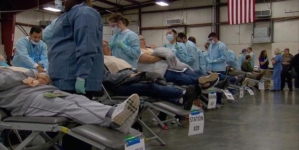-
Spain vs. Portugal: UEFA Nations League Final updates, highlights - 6 mins ago
-
National Guard on Scene Following Los Angeles Protests: Police - 25 mins ago
-
Chris Pratt shows off dramatic transformation with fake mustache on set - 33 mins ago
-
A bright side to another loss? Why the USMNT feels good despite sloppy showing - 48 mins ago
-
A political lesson for L.A. from an unrestrained president - 53 mins ago
-
Southern States Brace for Storms After Deadly System Saturday - about 1 hour ago
-
2025 Big Bets report: Two 7-figure bets land on Thunder to win NBA Finals - 2 hours ago
-
Zelensky Addresses ‘Complicated’ Aftermath of Oval Office Blowup With Trump - 2 hours ago
-
Former Villanova coach Jay Wright not interested in Knicks head coach job - 2 hours ago
-
House Speaker Says Deploying Marines in Los Angeles Not ‘Heavy-Handed’ - 2 hours ago
President Trump on Monday suggest he might temporarily exempt the auto industry from tariffs he previously imposed on the sector, to give carmakers time to overhaul their highly complex supply chains.
Mr. Trump on Monday told reporters gathered in the Oval Office that automakers “need a little bit of time” to relocate production from Canada, Mexico and other places to the U.S.
Car manufacturers’ supply chains are tightly interwoven with other nations, making it almost impossible to make vehicles entirely in the United States.
Because U.S. automakers source many of their car parts from key trade partners, including Canada, Mexico and China, a fully-American made car doesn’t exist, according to experts.
Mr. Trump has previously reversed course on tariffs, causing upheaval in the financial markets, and leading to economists raising their expectations of the U.S. economy entering a recession this year.
The 25% tariffs on foreign-made cars, which Mr. Trump designed with the intention of reshoring auto manufacturing to the U.S., threaten to raise car prices for consumers by thousands of dollars.
The price of a typical car could rise by between $5,000 to $10,000 “out of the gates” due to the new tariffs, according to a March 31 estimate from Wedbush Securities analyst Dan Ives.





























